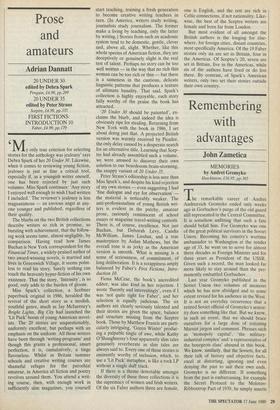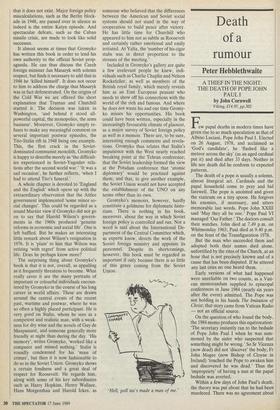Remembering with advantages
John Zametica
MEMORIES by Andrei Gromyko
Hutchinson, f16.95, pp.365
Tie remarkable career of Andrei Andreevich Gromyko ended only weeks ago in Gorbachov's purge of the old guard still represented in the Central Committee. It is somehow unfitting that such a fate should befall him. For Gromyko was one of the great political survivors in the Soviet Union. Becoming his country's wartime ambassador to Washington at the tender age of 33, he went on to serve for almost three decades as Foreign Minister and for three years as President of the USSR. Given such a record, the man looked far more likely to stay around than the per- manently embattled Gorbachov.
Last year Gromyko published in the Soviet Union two volumes of memoirs which he has now abridged and to some extent revised for his audience in the West. It is not an everyday occurrence that a retired Soviet official of Gromyko's senior- ity does something like that. But we know, in such an event, that we should brace ourselves for a large dose of irritating Marxist jargon and comment. Phrases such as 'monopoly capital', 'the military- industrial complex' and 'a representative of the bourgeois class' abound in this book. We know, similarly, that the Soviets, for all their talk of history and objective facts, excel at distorting, ignoring and even denying the past to suit their own ends. Gromyko is no different. If something from the past is embarrassing, for example the Secret Protocol to the Molotov- Ribbentrop Pact of 1939, he simply asserts that it does not exist. Major foreign policy miscalculations, such as the Berlin block- ade in 1948, are passed over in silence as indeed is the entire Katyn episode. And spectacular defeats, such as the Cuban missile crisis, are made to look like solid successes.
It almost seems at times that Gromyko has written this book in order to lend his own authority to the official Soviet prop- aganda. He can thus discuss the Czech foreign minister Jan Masaryk with solemn respect, but finds it necessary to add that in 1948 he 'killed himself. It does not occur to him to address the charge that Masaryk was in fact defenestrated. On the origins of the Cold War we are offered the short explanation that Truman and Churchill started it. The decision was taken in Washington, 'and behind it stood all- powerful capital, the monopolies, the arms business'. Moreover, Gromyko simply re- fuses to make any meaningful comment on several important postwar episodes, the Tito-Stalin rift in 1948 being one example. This, the first crack in the Soviet- dominated communist monolith, Gromyko is happy to describe merely as 'the difficult- ies experienced in Soviet-Yugoslav rela- tions after the second world war.' It was a sad occasion', he further reflects, 'when I had to attend Tito's funeral.'
A whole chapter is devoted to 'England and the English' which opens up with the extraordinary observation that the Attlee government implemented 'some minor so- cial changes'. This could be regarded as a sound Marxist view if Gromyko did not go on to say that Harold Wilson's govern- ments in the 1960s produced 'genuine reforms in economic and social life'. One is left baffled. But he makes an interesting little remark about Wilson's resignation in 1976. It is 'plain' to him that Wilson was retiring 'with regret' from active political life. Does he perhaps know more?
The surprising thing about Gromyko's book is that it is not, overall, as appalling as it frequently threatens to become. What really saves it are the many portraits of important or colourful individuals encoun- tered by Gromyko in the course of his long career in world affairs. These are drawn around the central events of the recent past, wartime and postwar, where he was so often a highly placed participant. He is very good on Stalin, whom he sees as a competent and realistic man, with a weak- ness for dry wine and the novels of Guy de Maupassant, and someone generally more friendly at night than during the day. 'His memory', writes Gromyko, 'worked like a computer and missed nothing.' Stalin is roundly condemned for his 'mass of crimes', but then it is now fashionable to do so in the Soviet Union. Gromyko shows a certain fondness and a great deal of respect for Roosevelt. He regards him, along with some of his key subordinates such as Harry Hopkins, Henry Wallace, Hans Morgenthau and Harold Ickes, as someone who believed that the differences between the American and Soviet social systems should not stand in the way of cooperation to build peace after victory. He has little time for Churchill who appeared to him not as subtle as Roosevelt and certainly rather emotional and easily irritated. At Yalta, the 'number of his cigar stubs was in direct proportion to the stresses of the meeting.'
Included in Gromyko's gallery are quite a few irrelevant people he knew, indi- viduals such as Charlie Chaplin and Nelson Rockefeller, as well as members of the British royal family, which merely reveals him as an East European peasant who needs to show off his connections with the world of the rich and famous. And where he does not waste his and our time Gromy- ko misses his opportunities. His book could have been written, especially in the increasingly favourable climate of glasnost, as a major survey of Soviet foreign policy as well as a memoir. There are, to be sure, interesting enough comments and revela- tions. Gromyko thus relates that Stalin's impatience with the West nearly reached breaking point at the Tehran conference; that the Soviet leadership formed the view at the Potsdam conference that 'atomic diplomacy' would be practised against them; and that, to give another example, the Soviet Union would not have accepted the establishment of the UNO on any terms other than its own.
Gromyko's memoirs, however, hardly constitute a goldmine for diplomatic histo- rians. There is nothing in his book, moreover, about the way in which Soviet foreign policy is controlled and run. Not a word is said about the International De- partment of the Central Committee which, as experts know, directs the work of the Soviet foreign ministry and appoints its personnel. Despite its shortcomings, however, this book must be regarded as important if only because there is so little of this genre coming from the Soviet Union.
'Hell, poll tax's made a man of me.'



















































 Previous page
Previous page